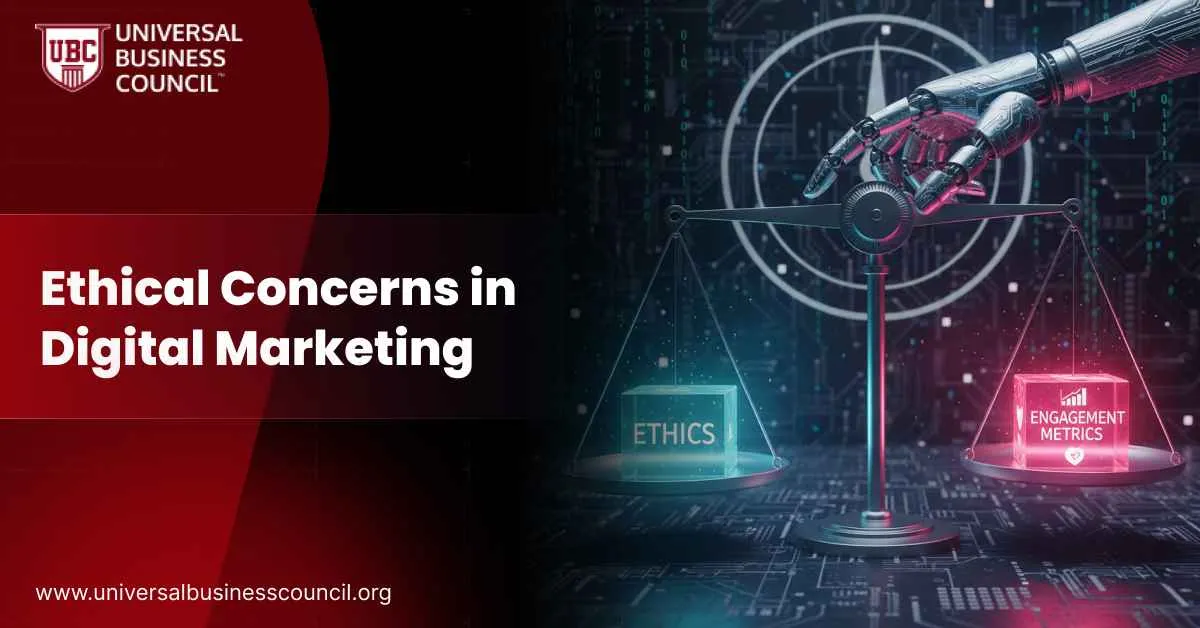 Digital marketing is a powerful way to reach audiences, but it also raises serious ethical concerns. From collecting personal data to using artificial Intelligence in ads, marketers today face the challenge of staying creative while respecting consumer rights. The question is no longer whether brands should act ethically, but how they can do it consistently.
In 2025, ethics and transparency have become central to successful marketing. Customers are smarter and regulators are stricter. Businesses that fail to protect privacy or mislead users risk losing both trust and revenue. Professionals who want to master ethical digital practices can start with an AI Digital Marketing Course, which helps them understand how technology, compliance, and creativity work together in the modern marketing ecosystem.
Digital marketing is a powerful way to reach audiences, but it also raises serious ethical concerns. From collecting personal data to using artificial Intelligence in ads, marketers today face the challenge of staying creative while respecting consumer rights. The question is no longer whether brands should act ethically, but how they can do it consistently.
In 2025, ethics and transparency have become central to successful marketing. Customers are smarter and regulators are stricter. Businesses that fail to protect privacy or mislead users risk losing both trust and revenue. Professionals who want to master ethical digital practices can start with an AI Digital Marketing Course, which helps them understand how technology, compliance, and creativity work together in the modern marketing ecosystem.
What Is Digital Marketing Ethics?
Digital marketing ethics means following a set of principles that ensure honesty, fairness, and respect for consumer rights. It covers everything from how data is collected and stored to how ads are designed and shared.
Ethical marketers value privacy, avoid manipulation, and make sure their content is accurate and transparent. They clearly tell users what information is being gathered and how it will be used.
Those who want to explore the technologies shaping ethical marketing can earn a Deep Tech Certification
from Blockchain Council. It helps professionals understand the technical foundation of secure and transparent systems that build consumer trust.
Why Does Ethics Matter in Digital Marketing?
In a world where consumers are constantly online, digital marketing has huge influence. Every click, ad, and post can shape opinions and buying behavior. But with this power comes responsibility.
People expect brands to protect their data and tell the truth. Misleading ads, fake reviews, or intrusive tracking can damage credibility instantly. Ethical marketing is not just good for reputation — it is now a legal requirement in many countries.
Professionals who want to combine ethics with technical knowledge can pursue a Tech Certification
from Global Tech Council. It equips marketers with tools to create data-driven campaigns that comply with global privacy laws.
What Are the Main Ethical Issues in Digital Marketing?
Ethical issues in digital marketing usually fall into a few major areas: data privacy, consent, honesty, targeting, and transparency. Below are the key challenges and how responsible brands can handle them.
How Should Marketers Handle Privacy and Consent?
Data is the core of digital marketing. Every click or visit generates valuable insights. However, using personal information without proper consent violates both ethics and law.
Marketers must make it clear why data is being collected and give users real choices to accept or refuse. Hiding “reject” buttons, forcing sign-ups, or using confusing wording are known as dark patterns — and they are now illegal in many regions.
Respecting privacy builds credibility and shows that a brand values fairness as much as profit.
How Can Businesses Use AI in an Ethical Way?
Artificial Intelligence helps marketers automate campaigns, personalize ads, and analyze trends. But it can also create misleading or biased content if not monitored carefully.
Consumers deserve to know when an ad or message was created by AI. Clear disclosure prevents misinformation and keeps campaigns honest. The EU and UK now require such transparency.
For marketers using AI tools, continuous learning is vital. A Tech Certification
from Global Tech Council provides practical knowledge about automation and AI systems that comply with ethical guidelines.
Is Targeted Advertising Always Fair?
Targeting is what makes digital marketing efficient, but it can easily become invasive. Using sensitive data such as religion, race, or health information is unethical and often illegal.
Algorithmic targeting can also create bias by excluding certain groups or showing different offers based on unfair assumptions. Ethical marketers regularly review their targeting systems and apply filters to prevent discrimination.
What Are Dark Patterns in Marketing?
Dark patterns are tricky design tactics that push users toward unwanted actions, such as signing up for newsletters or accepting cookies. Regulators like the FTC and EU now investigate and fine companies that use them.
Honest marketing means giving users equal and visible options. Opting out should be as simple as opting in. This not only complies with law but strengthens consumer trust in the long term.
Why Are Fake Reviews and Influencer Transparency So Important?
Online reviews and influencer posts are a major part of digital marketing. Unfortunately, fake testimonials or undisclosed sponsorships still exist.
In 2025, the FTC officially banned fake reviews and now requires influencers to clearly disclose paid collaborations. Brands that fail to comply can face heavy penalties.
The solution is transparency. Marketers should ensure every partnership and endorsement is honest and clearly labeled. Real trust comes from authenticity, not manipulation.
Should Children and Teens Be Targeted with Ads?
Children and teenagers are among the most active internet users but also the most vulnerable. That’s why several laws, including the EU Digital Services Act and the U.S. COPPA rule, limit behavioral ads directed at minors.
Ethical marketers avoid tracking young users or personalizing content for them. Instead, they focus on educational or family-friendly campaigns that respect age boundaries.
Why Is Greenwashing a Big Problem?
Sustainability is now a strong selling point, but some brands exaggerate their environmental impact. This is called greenwashing. The EU Green Claims Directive aims to stop it by requiring proof for any environmental claim.
To stay ethical, marketers must back up green messages with real evidence such as certifications, audits, or third-party reports. False sustainability claims may boost short-term interest but destroy long-term trust.
How Should Businesses Handle Cookies and Tracking?
With third-party cookies being phased out, marketers must find ethical ways to measure performance. First-party data — information collected directly from users with consent — is the best alternative.
Google’s Privacy Sandbox introduces privacy-friendly tools for ads, but marketers still need to explain tracking clearly. Every privacy policy should tell users what’s being tracked, for how long, and why.
Professionals can learn how to design privacy-first marketing systems through the Marketing and Business Certification
from Universal Business Council. It teaches practical methods to align business strategy with ethical data practices.
What Laws Regulate Digital Marketing Ethics?
In 2025, global laws governing digital marketing have become much stricter. Some of the key ones include:
- EU Digital Services Act (DSA): Requires transparency in ads and bans targeting children.
- EU AI Act: Forces companies to disclose AI use in marketing materials.
- FTC Endorsement Rules: Ban fake reviews and require influencer disclosure.
- UK ASA and CAP Guidance: Mandate clear labeling of AI-generated ads.
- U.S. State Privacy Laws: California and Colorado enforce universal opt-out systems and prohibit dark patterns.
Complying with these regulations is part of ethical marketing. Ignoring them can lead to reputational and financial damage.
How Can Businesses Stay Compliant and Ethical?
- Create clear privacy policies that explain how data is collected and used.
- Train teams regularly to understand new advertising and data regulations.
- Audit your campaigns for transparency and accuracy before publishing.
- Work with responsible vendors who follow similar ethical standards.
- Set up internal guidelines that define what is acceptable and what isn’t in marketing practices.
Learning continuously through certifications keeps marketers updated. The Deep Tech Certification
from Blockchain Council helps marketers build technical integrity, while the Marketing and Business Certification
from Universal Business Council focuses on ethical leadership and strategic alignment.
What Do Consumers Expect from Ethical Marketing?
Today’s consumers value privacy, honesty, and inclusivity. They want to know that brands treat them fairly and use technology responsibly. Surveys show that people are more likely to buy from companies that are open about data use and avoid manipulative tactics.
Ethical marketing also improves long-term performance. Trust increases customer loyalty, which translates into higher retention and brand advocacy. In short, doing the right thing is good business.
Do companies have to disclose AI use in ads?
Yes. If AI is used to generate or customize ads, disclosure is required under the EU AI Act and other advertising guidelines.
Can digital marketers use personal data for targeting?
Only with explicit user consent. Sensitive information such as health or political data should never be used.
What is the best way to handle fake reviews?
Never buy or sell reviews. Always encourage genuine feedback and make sure influencers disclose all paid collaborations.
Are sustainability claims regulated?
Yes. Green claims must be supported with scientific evidence or certification to avoid penalties for greenwashing.
How can small businesses stay compliant?
Start by collecting only necessary data, using clear consent forms, and regularly updating privacy policies. Joining an AI Digital Marketing Course can also help small teams learn practical compliance strategies.
Conclusion
Ethical concerns in digital marketing are shaping the future of business. It is no longer enough to create catchy campaigns — brands must also respect privacy, disclose AI use, and promote honesty in every interaction.
Digital marketing thrives on trust. When businesses combine innovation with integrity, they not only meet legal standards but also earn lasting respect from consumers.
 Digital marketing is a powerful way to reach audiences, but it also raises serious ethical concerns. From collecting personal data to using artificial Intelligence in ads, marketers today face the challenge of staying creative while respecting consumer rights. The question is no longer whether brands should act ethically, but how they can do it consistently.
In 2025, ethics and transparency have become central to successful marketing. Customers are smarter and regulators are stricter. Businesses that fail to protect privacy or mislead users risk losing both trust and revenue. Professionals who want to master ethical digital practices can start with an AI Digital Marketing Course, which helps them understand how technology, compliance, and creativity work together in the modern marketing ecosystem.
Digital marketing is a powerful way to reach audiences, but it also raises serious ethical concerns. From collecting personal data to using artificial Intelligence in ads, marketers today face the challenge of staying creative while respecting consumer rights. The question is no longer whether brands should act ethically, but how they can do it consistently.
In 2025, ethics and transparency have become central to successful marketing. Customers are smarter and regulators are stricter. Businesses that fail to protect privacy or mislead users risk losing both trust and revenue. Professionals who want to master ethical digital practices can start with an AI Digital Marketing Course, which helps them understand how technology, compliance, and creativity work together in the modern marketing ecosystem.




Leave a Reply